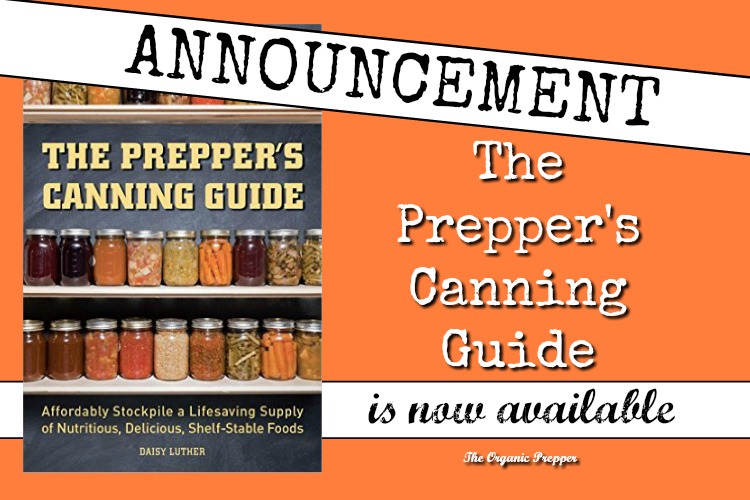If you're new here, you may want to subscribe to my RSS feed. Thanks for visiting!
By Daisy Luther

I’m excited to announce that my new book is out. The Prepper’s Canning Guide: Affordably Stockpile a Lifesaving Supply of Nutritious, Delicious, Shelf-Stable Foods is now available on Amazon.
Here’s how this book is different
If you already own my self-published canning book, The Organic Canner, you will notice some of the same recipes. But this book has a twist – it was written with preppers in mind. It contains not only dozens of additional recipes but also information unique to those who prep:
- How to can when the power goes out
- What canning supplies you should keep on hand in quantity for long-term disasters
- How to save the contents of your fridge and freezer in the event of a lengthy power outage
- Old-fashioned methods that don’t require store-bought ingredients like pectin
- Modern updates using the latest food science research to make your supply as safe as possible
These updates cover many of the questions I receive from preppers about post-collapse canning.
The recipes can easily be geared to what you have
Another thing that I did throughout this book was to create recipes that you can adjust based on the supplies that you have on hand.
You’ll find lots of “kitchen-sink” garden recipes for chutneys, soups, and relishes. There’s a section on canning “Roast Beast” that covers canning pork, venison, beef – whatever you have recently harvested or purchased at the store in bulk. There is an entire chapter on how to safely can your own recipes, plus charts for canning different types of garden produce safely.
I did this because, particularly during an emergency, you may have odds and ends that need to be preserved quickly. When you don’t have access to the store, you may not have a perfect bushel of one type of produce and you may need to be creative with your ingredients. At the same time, you want to do this safely.
The book is good for beginners and experienced canners
There’s a thorough section of instructions for those who are just getting started with canning. It includes a discussion on the reasons for the best possible food safety practices, very simple how-to instructions, and the answers to many frequently asked questions about both water bath and pressure canning.
For those who are experienced canners, you may want to skip right to the recipes. You’ll find all sorts of meals in jars that you can put back for the healthiest, homemade “fast food” around.
I hope you enjoy The Prepper’s Canning Guide!
If you get the book and love it, please know that good reviews can be invaluable on Amazon. An abundance of good reviews helps the books of your favorite authors show up higher in searches when people are looking for a book on a topic. Five-star reviews are greatly appreciated, but only if you feel like it’s deserved, of course.
As always, I thank you for your support. You guys are the best readers around and knowing you all has changed my life for the better.
[thrive_link color=’teal’ link=’http://amzn.to/2n6188V’ target=’_blank’ size=’medium’ align=’aligncenter’]Order The Prepper’s Canning Guide[/thrive_link]















10 Responses
I want it…And I’m sure it’ll get my 5 star, 2 thumbs up review on Amazon! ????????☕
Take care…
Thank you!!!! You are the best, Dave! 🙂
Just ordered it via Amazon Prime…it’ll be here Saturday. A book written by one of my Sheroes…I’m gonna read every word!
Thank you! 🙂
After being a very active canner for 30 some years the last two years we’ve had an awful time getting our water bathed canned goods (peaches or pears) to seal. We are using canning flats that we bought maybe 8 years ago by the case. Does the rubber go bad after a certain amount of time? If so what is the answer for us peppers who have tried to put things away for the future?
The seals can go bad if they are subjected to any extremes in temperature. Cold can make the rubber brittle and heat can make it gummy. It’s important to store the lids in an environment that doesn’t reach any extremes. Also, excess humidity is to be avoided. As far as a length of time, I’m honestly not sure if there’s an expiration. You could consider trying Tattler reusable lids for a long-term solution, but I really didn’t care for them.
Hey Daisy! Quick note – I noticed that your picture of cans shows that they still have the ring on. I have noticed on another site belonging to Guildbrook Farm, they take the ring off so they can be sure that the ‘pop’ is from the lid and not the ring, thus preventing false seals. I do recommend that you look at Guildbrook Farm’s videos – they are very educational and they’re also Preppers and homesteaders like you 🙂
Hi Anonymous 🙂
I agree wholeheartedly about taking the rings off. Another issue is that moisture can get trapped in there and cause a sealed jar come unsealed later on. The cover photo was the best representation of home-canned goods available to the publishing company 🙂 Those aren’t actually my jars.
Thanks for the tip – those videos sound interesting!
Daisy, I so respect your work. Thank you.
Have ordered three copies of your new book as gifts for friends, who will put the info to good use.
That’s assuming spring will come; it’s snowing in the Rockies.
Thank you so much! I really appreciate it. I can’t wait for spring, either.